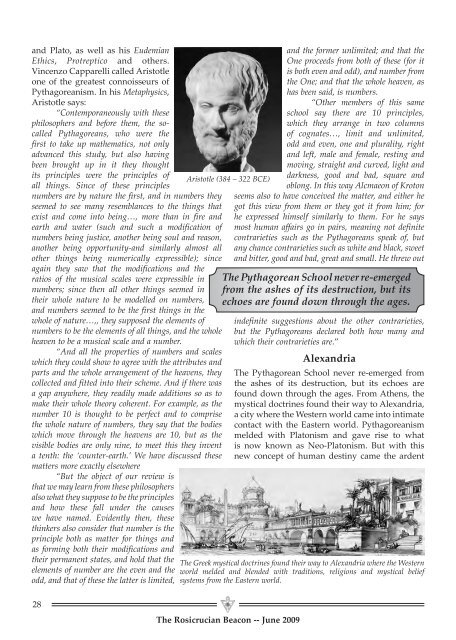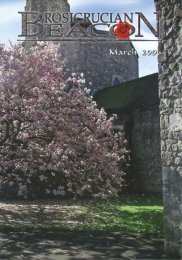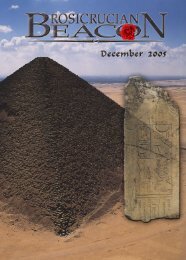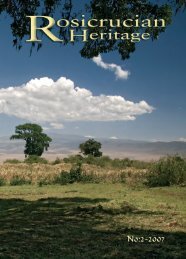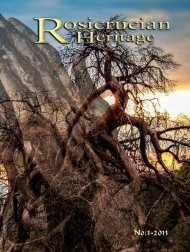RosicRucian - AMORC
RosicRucian - AMORC
RosicRucian - AMORC
- No tags were found...
Create successful ePaper yourself
Turn your PDF publications into a flip-book with our unique Google optimized e-Paper software.
and Plato, as well as his EudemianEthics, Protreptico and others.Vincenzo Capparelli called Aristotleone of the greatest connoisseurs ofPythagoreanism. In his Metaphysics,Aristotle says:“Contemporaneously with thesephilosophers and before them, the socalledPythagoreans, who were thefirst to take up mathematics, not onlyadvanced this study, but also havingbeen brought up in it they thoughtits principles were the principles ofall things. Since of these principlesnumbers are by nature the first, and in numbers theyseemed to see many resemblances to the things thatexist and come into being…, more than in fire andearth and water (such and such a modification ofnumbers being justice, another being soul and reason,another being opportunity-and similarly almost allother things being numerically expressible); sinceagain they saw that the modifications and theratios of the musical scales were expressible innumbers; since then all other things seemed intheir whole nature to be modelled on numbers,and numbers seemed to be the first things in thewhole of nature…,, they supposed the elements ofnumbers to be the elements of all things, and the wholeheaven to be a musical scale and a number.“And all the properties of numbers and scaleswhich they could show to agree with the attributes andparts and the whole arrangement of the heavens, theycollected and fitted into their scheme. And if there wasa gap anywhere, they readily made additions so as tomake their whole theory coherent. For example, as thenumber 10 is thought to be perfect and to comprisethe whole nature of numbers, they say that the bodieswhich move through the heavens are 10, but as thevisible bodies are only nine, to meet this they inventa tenth: the ‘counter-earth.’ We have discussed thesematters more exactly elsewhere“But the object of our review isthat we may learn from these philosophersalso what they suppose to be the principlesand how these fall under the causeswe have named. Evidently then, thesethinkers also consider that number is theprinciple both as matter for things andas forming both their modifications andtheir permanent states, and hold that theelements of number are the even and theodd, and that of these the latter is limited,Aristotle (384 – 322 BCE)and the former unlimited; and that theOne proceeds from both of these (for itis both even and odd), and number fromthe One; and that the whole heaven, ashas been said, is numbers.“Other members of this sameschool say there are 10 principles,which they arrange in two columnsof cognates…, limit and unlimited,odd and even, one and plurality, rightand left, male and female, resting andmoving, straight and curved, light anddarkness, good and bad, square andoblong. In this way Alcmaeon of Krotonseems also to have conceived the matter, and either hegot this view from them or they got it from him; forhe expressed himself similarly to them. For he saysmost human affairs go in pairs, meaning not definitecontrarieties such as the Pythagoreans speak of, butany chance contrarieties such as white and black, sweetand bitter, good and bad, great and small. He threw outThe Pythagorean School never re-emergedfrom the ashes of its destruction, but itsechoes are found down through the ages.indefinite suggestions about the other contrarieties,but the Pythagoreans declared both how many andwhich their contrarieties are.”AlexandriaThe Pythagorean School never re-emerged fromthe ashes of its destruction, but its echoes arefound down through the ages. From Athens, themystical doctrines found their way to Alexandria,a city where the Western world came into intimatecontact with the Eastern world. Pythagoreanismmelded with Platonism and gave rise to whatis now known as Neo-Platonism. But with thisnew concept of human destiny came the ardentThe Greek mystical doctrines found their way to Alexandria where the Westernworld melded and blended with traditions, religions and mystical beliefsystems from the Eastern world.28The Rosicrucian Beacon -- June 2009


